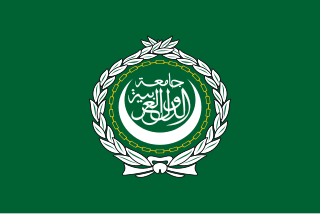
The Arab League, formally the League of Arab States, is a regional organization in the Arab world, which is located in North Africa, West Asia, and part of East Africa. The Arab League was formed in Cairo on 22 March 1945, initially with six members: Egypt, Iraq, Transjordan, Lebanon, Saudi Arabia, and Syria. Yemen joined as a member on 5 May 1945. Currently, the League has 22 members.

SuperStar was an Arabic television show based on the popular British show Pop Idol created by Simon Fuller's 19 Entertainment & developed by Fremantle Media. The show unites the Arab community by democratically choosing the next singing sensation. The show is broadcast worldwide on Future TV, a Lebanese television station. It is also the first Idol franchise to feature contestants from multiple countries.

The Middle East and North Africa is a geographic region whose countries are often referred to by the acronym MENA. It is also known as WANA, SWANA, or NAWA, which alternatively refers to the Middle East as West Asia or as Southwest Asia; this is another way to reference the geographical region, instead of using the more common political terminology.

Rached Ghannouchi, also spelled Rachid al-Ghannouchi or Rached el-Ghannouchi, is a Tunisian politician, the co-founder of the Ennahdha Party and serving as its intellectual leader. He was born Rashad Khriji.

Dr.Aref Ali Nayed is a Libyan Islamic scholar and a former Libyan Ambassador to the United Arab Emirates. Nayed is the founder and director of Kalam Research & Media (KRM), based in Tripoli, Libya and Dubai. Until the outbreak of the revolution in Libya, he lectured on Islamic theology, logic, and spirituality at the restored Uthman Pasha Madrassa in Tripoli, and supervised graduate students at the Islamic Call College there. Before the liberation of Tripoli in 2011, he was appointed by the National Transitional Council as the coordinator of the Tripoli Taskforce. When Tripoli was liberated in late August 2011, the remit was broadened and he was made the lead coordinator of the Libya Stabilization Team. Earlier in the year, he was the coordinator for the Support Offices of the Executive Team of the National Transitional Council (NTC) of Libya. He is also the secretary of the Network of Free Ulema – Libya.According to the Royal Aal al-Bayt Institute for Islamic Thought, Nayed is ranked 50th among the top 500 most influential Muslims in the world.
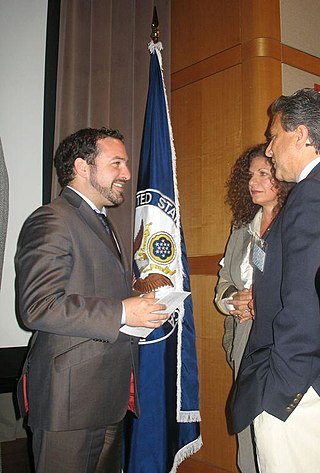
In his "A New Beginning" speech on June 4, 2009, at Cairo University in Cairo, Egypt, President of the United States Barack Obama announced, "I will host a Summit on Entrepreneurship this year to identify how we can deepen ties between business leaders, foundations and social entrepreneurs in the United States and Muslim communities around the world". The Presidential Summit on Entrepreneurship, held in Washington, D.C., on Monday April 26, and Tuesday, April 27, 2010, at the Ronald Reagan Building, followed through on President Obama's commitment by highlighting the importance of social and economic entrepreneurship, and strengthening mutually-beneficial relationships with entrepreneurs in Muslim-majority countries and Muslim communities around the world. At the second summit in Istanbul, Turkey, Vice President Joe Biden announced that the Presidential Summit would become the marquee event that kicks off Global Entrepreneurship Week each year, with the 2013 host being the United Arab Emirates.

Mohamed Moncef Marzouki is a Tunisian politician who served as the fifth president of Tunisia from 2011 to 2014. Through his career he has been a human rights activist, physician and politician. On 12 December 2011, he was elected President of Tunisia by the Constituent Assembly.
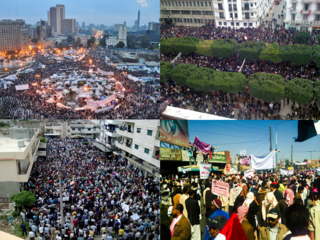
The Arab Spring or the First Arab Spring was a series of anti-government protests, uprisings and armed rebellions that spread across much of the Arab world in the early 2010s. It began in Tunisia in response to corruption and economic stagnation. From Tunisia, the protests then spread to five other countries: Libya, Egypt, Yemen, Syria and Bahrain. Rulers were deposed or major uprisings and social violence occurred including riots, civil wars, or insurgencies. Sustained street demonstrations took place in Morocco, Iraq, Algeria, Lebanon, Jordan, Kuwait, Oman and Sudan. Minor protests took place in Djibouti, Mauritania, Palestine, Saudi Arabia and the Moroccan-occupied Western Sahara. A major slogan of the demonstrators in the Arab world is ash-shaʻb yurīd isqāṭ an-niẓām!.
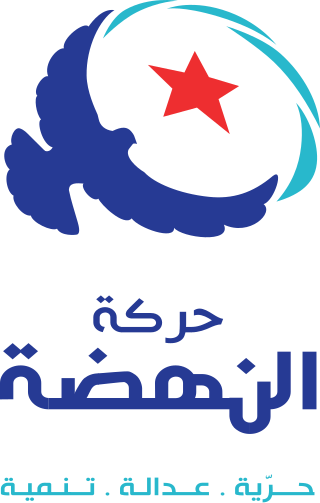
The Ennahda Movement, also known as the Renaissance Party or simply known as Ennahda, is a self-defined Islamic democratic political party in Tunisia.

Beji Caid Essebsi was a Tunisian politician who served as the 6th president of Tunisia from 31 December 2014 until his death on 25 July 2019. Previously, he served as the minister of foreign affairs from 1981 to 1986 and as the prime minister from February 2011 to December 2011.

Hamadi Jebali is a Tunisian engineer, Muslim politician and journalist who was Prime Minister of Tunisia from December 2011 to March 2013. He was the Secretary-General of the Ennahda Movement, a moderate Islamic party in Tunisia, until he left his party in December 2014 in the course of the 2014 Tunisian presidential election.

The Tunisian Ba'ath Movement is a political party in Tunisia. It is the Tunisian regional branch of the Iraqi-led Ba'ath Party.

The Group of Friends of the Syrian People is an international diplomatic collective of countries and bodies convening periodically on the topic of Syria outside the U.N. Security Council. The collective was created in response to a Russian and Chinese veto on a Security Council resolution condemning Syria.
A political crisis evolved in Tunisia following the assassination of leftist leader Mohamed Brahmi in late July 2013, during which the country's mainly secular opposition organized several protests against the ruling Troika alliance that was dominated by Rashid al-Ghannushi's Islamist Ennahda Movement. The events came as part of the aftermath of the Tunisian Revolution which ousted the country's longtime president Zine El Abidine Ben Ali, followed by a general election which saw Ennahda win a plurality alongside Moncef Marzouki's allied Congress for the Republic (CPR). The crisis gradually subsided when Prime Minister Ali Laarayedh resigned and a new constitution was adopted in January 2014.
Silatech is an organization based in Qatar, founded by Her Highness Sheikha Mozah bint Nasser. The current CEO of this organization is Mr. Hassan Al Mulla. Silatech means "your connection" in Arabic. The initiative seeks to create jobs and economic opportunities for young people in the Arab world, targeting 18- to 30-year-olds. by 2016, Silatech claims to have helped 200,000 young Arabs to obtain jobs. The initiative’s model involves building partnerships with governments, private companies and NGOs.
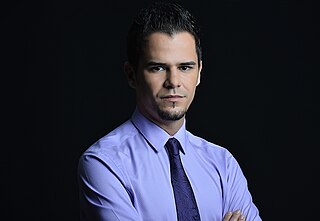
Belabbes Benkredda is an Algerian-German social innovator, writer, television commentator, and government consultant who specializes in public diplomacy. He is the founder of The Munathara Initiative, an Arab online and television debate forum that promotes the voices of youth, women and marginalized communities in the Arab public. He was a recipient of the 2013 Democracy Award of the National Democratic Institute, and is a Fellow of the Salzburg Global Seminar. In 2016 he was named a World Fellow by Yale University.

The Tunisian National Dialogue Quartet is a group of four civil society organizations that were central mediators in the effort to consolidate democratic gains and to form a lasting constitutional settlement in Tunisia following the unrest and historic regime change of the 2011 Jasmine Revolution.[1]
The 2017 Arab League Summit was held near the Dead Sea in Jordan on 29 March 2017.

The Popular Front for the Liberation of Libya is a Gaddafi loyalist militia and political party that aims to elect Saif al-Islam Gaddafi, son of the late Libyan leader Muammar Gaddafi, as president of Libya.

















